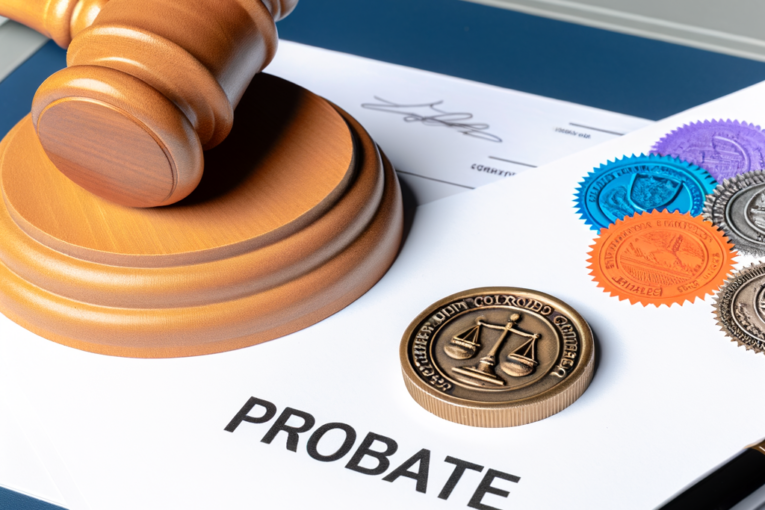Have you ever wondered about the consequences of passing away without a will? Look no further, as this blog post will explore the legal implications of dying intestate and how it can significantly impact your loved ones.
A will is not just a mere piece of paper; it holds immense importance as a legal document outlining your wishes for asset distribution and childcare provisions after you’re gone. Without it, the distribution process falls under probate laws, which may not align with what you truly want.
We’ll look deeper into the ramifications of not having a will, specifically how it can affect your loved ones left behind. From complications in estate division to uncertainties in guardianship for minor children, we’ll shed light on it all.
The goal is to offer detailed insights while maintaining clarity and precision, ensuring you are well informed about the importance of having a will in place.
Key Takeaways
- Dying without a will can result in the estate being subject to intestacy laws, leading to a lengthy probate process and a distribution that may not align with the decedent’s wishes.
- It is important to have a will, as it dictates asset distribution, enables the nomination of guardians for minor children, and appoints an executor to oversee the probate process, preventing intestacy issues.
- Probate is the process that facilitates the orderly administration and distribution of the estate, initiated with an affidavit of administration and involving the appointment of an administrator and the granting of letters of administration.
- Dying without a will can have significant impacts on loved ones, causing emotional and financial turmoil, conflicts among heirs, heavy financial burdens, compromised legal rights, and assets ending up in unintended hands.
What Happens if You Die Without a Will?
When someone passes away without leaving a will, their estate is subject to intestacy laws, and the probate court distributes it in accordance with the intestate succession laws of their state. This can result in a lengthy probate process where the distribution of assets may not align with the decedent’s wishes.
Without a beneficiary designation, certain relatives could be overlooked or receive less than anticipated. The complexity of these laws often necessitates assistance from an estate planning attorney to ensure legal accuracy and fair distribution.
It’s essential for individuals to understand the potential consequences of dying intestate, as it can significantly impact inheritance rights and provoke familial discord during an already tumultuous period.
What is a Will?
A will, a crucial instrument in estate planning, serves as the legal document that clearly outlines an individual’s wishes regarding the distribution of their assets, appointment of guardians for minor children, and resolution of debts upon their demise. It is instrumental in ensuring orderly inheritance and preventing intestacy issues.
- The will dictates asset distribution to designated beneficiaries following the laws of succession.
2. It enables the nomination of guardians for underage dependents to ensure their welfare.
3. The executor named in the will oversees the probate estate administration process.
Without a valid will, one’s estate becomes subject to the laws of intestacy, which may not align with personal desires or family needs. Hence, having a legally accurate will is fundamental to effective estate planning.
What is Probate?
Probate, an essential legal procedure following a person’s death, facilitates the orderly administration and distribution of their estate according to either their will or statutory intestacy laws. If there is no will, an affidavit of administration initiates the probate process. The administrator then needs to secure an estate bond before managing the estate’s assets.
Potential challenges within this legal process may include disputes over property division or claims against the deceased’s estate. An experienced probate lawyer can help navigate these difficulties.
The administrator receives letters of administration and administrator certificates as part of this process. They play a crucial role in ensuring intestate succession happens smoothly.
| Probate Step | Description |
| Affidavit of Administration | initiates a probate proceeding |
| Estate Bond | Secures liability for estate assets |
| Letters of Administration | Grants authority to administer the estate |
How Dying Without a Will Affects Your Loved Ones
Dying intestate (without a will) often results in significant emotional and financial turmoil for the deceased’s loved ones, exacerbating an already stressful and difficult time. Beyond mourning the loss, they must navigate the complex process of distributing the intestate estate under inheritance laws, with limited legal rights that may not reflect their actual needs or desires.
The uncertainty over asset distribution can cause conflict among heirs, straining relationships during an already difficult period.
Loved ones may bear a heavy financial burden due to potentially prolonged probate proceedings.
Rigid inheritance laws that don’t take into account individual circumstances may compromise the legal rights of recipients.
Without clear instructions for distribution, valuable assets could inadvertently end up in unintended hands.
Understanding these challenges underscores the importance of drafting a will before death.
What Happens to Your Things When You Die Without a Will?
Upon one’s passing, with no legally prepared will in place, the distribution of personal possessions and assets typically falls under the jurisdiction of a probate court. In such situations, intestacy laws control the allocation process. These dictate that if an individual dies without an estate plan, their entire estate is divided among legal heirs according to a predetermined order of succession.
The deceased person’s real estate and personal property are allocated first to surviving spouses or domestic partners. If none exist or survive, then children are next in line. The chain continues onward to parents, siblings, and extended family members should the deceased have no direct descendants.
This legal framework serves as a default mechanism for ensuring the fair dispersion of assets when no will exists.
Who Takes Care of Your Kids if You Die Without a Will?
Establishing a legal guardian for minor children becomes a paramount concern when parents pass away without having drafted a will. In such cases, the surviving parent usually assumes full responsibility for the child. If both parents are deceased or if the surviving parent is deemed unfit, closer relatives might be considered potential guardians. However, these decisions often rest on state laws and court judgments.
The process of determining guardianship involves formal legal documents and applications.
Close relatives may have to vie for legal guardianship in contentious situations.
If no family member can serve as an adoptive parent, the child could become a ward of the state.
The welfare of minor children is prioritized above all else during these proceedings to ensure they receive appropriate care.
How Do You Write a Will?
Crafting a legally sound will, whether simple or complex, requires careful consideration and, often, professional guidance. When an individual wishes to dictate the estate split upon their death, they must write a will.
When dealing with a complex estate or specific wishes regarding death benefits and intestate share allocation, hiring a lawyer is recommended.
A legal professional provides precise advice based on extensive knowledge of inheritance law. They provide the beneficiary with instructions explaining how to avoid potential disputes or legal issues after their demise.
Thus, depending on the complexity of one’s estate and personal wishes, different approaches are available to ensure accurate documentation of intentions post-death.
Conclusion
In conclusion, dying intestate, or without a will, can lead to complex legal proceedings that significantly impact surviving family members.
The importance of having a legally valid will cannot be overstated. It ensures the distribution of property according to one’s wishes and offers certainty regarding the care and guardianship of minor children.
Therefore, it is crucial to understand the process of creating a comprehensive will to safeguard loved ones’ interests after death.





